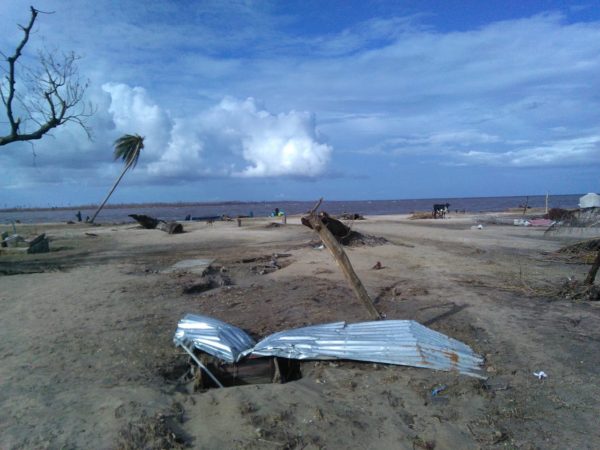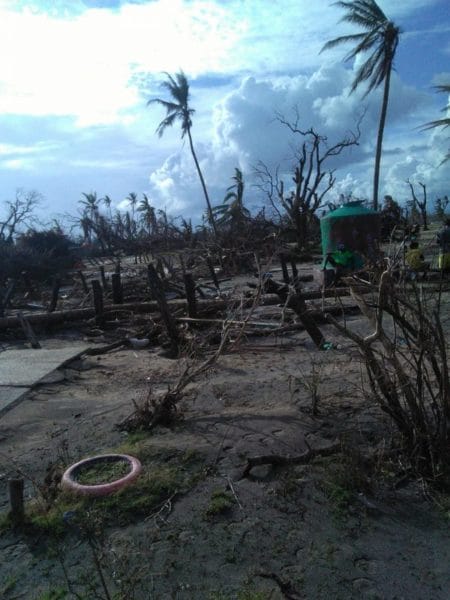28 de noviembre 2020

Children of Exile: The Births “Sowing Hope” in the Camp of Nicaraguan Farmers

PUBLICIDAD 1M
PUBLICIDAD 4D
PUBLICIDAD 5D
They’re going back despite the fact that there’s no water and the houses have all been destroyed.

Residents of Wawa Bar began returning to their community this week. They’re going back despite the fact that there’s no water and the houses have all been destroyed.
The family of 52-year-old Ramon Sedeno Alvarado returned home to Wawa Bar, but found only the kitchen. Ramon himself had never left the community. He’s a man of the sea and he prepared for the hurricanes. First, he firmly tied the house frame down with rope. Then he equipped himself with a lantern and life preservers. He was confident that he could stay afloat for four or five hours if the sea were to swallow him.
This week, dozens of evacuees from Wawa Bar began returning to the community. They’d left home only with the belongings they could carry in their arms. They were forced from their community by the strength of two powerful back-to-back hurricanes: Eta and Iota.
In a matter of hours, the hurricane winds took everything the residents had managed to construct over many years. The three churches – Moravian, Evangelical Protestant, and Adventist – didn’t escape the power of the natural phenomenon. Neither did the school or the health clinic. The area was left practically a desert.
Wawa Bar is located on Nicaragua’s North Caribbean coast, some 10 miles south of Bilwi on a small coastal littoral. It’s populated by members of the Miskito indigenous group. The area suffered the worst ravages of Hurricane Eta’s fury. This first hurricane slammed into the paradisical zone on November 3rd, as a Category 4 hurricane.
Leo, a native of Wawa Bar, found out for himself what it’s like to survive a hurricane. When the hurricane approached, families scrambled to take shelter. Some went to the evacuation centers set up by the government. Others were taken in by family members living in the regional capital of Bilwi (Puerto Cabezas). Leo and seven other people remained behind, to guard the belongings their family members hadn’t been able to carry.
He watched how Eta’s 155 m/h winds sent roofs flying, swallowed the board houses, and spit out their remains. He felt deeply afraid. So, when he learned that Hurricane Iota was headed for his community, he didn’t hesitate to seek shelter.
The emergency situation caused by Iota led 59,964 people to evacuate. They were taken to shelters and “houses of solidarity” in the municipalities of Waspam, Bilwi and Prinzaploka. By November 25th, only 5,033 people still remained in the shelters, according to declarations from Nicaragua’s vice president, Rosario Murillo.
Inhabitants returning to Wawa Bar from Bilwi must travel by sea some forty minutes to reach home, or what’s left of home. Iota was voracious and finished destroying anything that Eta had left standing.
Candida Tebas said that the first hurricane left some wooden houses damaged, but still there. Their occupants were able to improvise small huts to stay in. But this time, the foundations themselves disappeared. “It’s not there anymore, it broke in pieces,” she stated over the phone. “It” referred to the house her family had stayed in after Eta’s passing.
Of some 500 homes on Wawa Bar only five concrete homes survived, Candida estimates. All that’s left of the wooden constructions is debris scattered all around the zone. “I felt very sad today when I saw all the families returning and no one with where to stay. Not even a hut to stay in, or water, or food, or a place to eat and do things,” Candida Tevas said. She’s a native of Wawa Bar.
In her case, she took refuge in the house of family members in Bilwi. She explained that she can’t go back to her land because there aren’t even minimum conditions. Her oldest son has a disability. She has to be sure that he at least has a place to sleep before they return. Her cousins have been traveling to the community and have gathered pieces of zinc to make a roof. Now, they can hang up hammocks and sleep in the open air. They’ve told her all this and sent videos of the disastrous state of the community.
The people returning have grouped together to help each other out. They shelter in any part of the houses that has been left upright, because no intact wooden homes are left. Their main need is water, the community members say. The wells have been contaminated since Eta came through.
Ramon Sedeno’s family consists of eight people, four of them children. All of them left the shelter, where conditions were hard. They took with them 20 pounds of rice, a little sugar, and a little water. Enough food to escape hunger for a few days. There’s no access to clean water in the zone, but it’s raining “a little”. When it rains, they use black plastic to channel the drops and store the vital fluid. They wash their clothes in the ocean, and that’s how they’re surviving.

The most urgent demand from the people of Wawa Bar is for water. Foto: Cortesía
Ramon doesn’t know if the help the government claims is reaching the communities will one day reach his hands. He explained that zinc roofing is very important because the “cold winds” are coming soon. They need to construct their “little house” to protect themselves from the climate. He doesn’t know if his family will be favored with the 15 zinc sheets they’ve begun to deliver in Bilwi.
On November 24th, Vice President Murillo informed in her customary noon monologue that they’d delivered 56,000 sets of roofing materials. Some 270,000 sets have been shipped, mainly to the North Caribbean and the Mining Triangle further inland. However, in Wawa Bar the returning residents don’t know of any plan of support on the part of the authorities. They don’t know if they’ll get any help reconstructing their homes after the catastrophe.
The trees that Iota knocked down have been turned into firewood for all the community members. However, now everything is wet and they must wait, stated Candida Tebas. She noted that the government hasn’t said anything about the aid. She also asserted that there’ve been problems in the Bilwi neighborhoods. These have arisen because some people who need assistance from the authorities haven’t received anything.
However, the people have returned to Wawa Bar, and they’re looking for ways to resolve their situation. “No one has said, ‘Go back, we’ll help you. We’ll give you a hammer, a nail or whatever.’ No, they haven’t done this,” Candida concluded sadly.
PUBLICIDAD 3M
PUBLICIDAD 3D